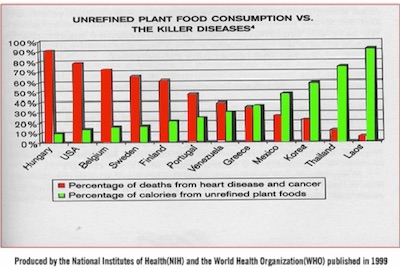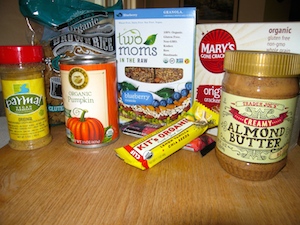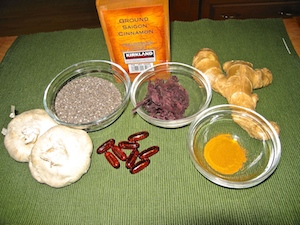
by plant4health | Mar 6, 2015 | Nutrition, Plant-based, Vegan, WFPB, Whole food, Whole food, plant-based
Doug Lisle, Ph.D. is a psychologist and co-author of The Pleasure Trap – Mastering the Hidden Force that Undermines Health and Happiness along with Alan Goldhamer. I had the “pleasure” of listening to a lecture by Dr. Lisle as part of the coursework I am taking to earn a certification in plant-based nutrition through Cornell’s online university, eCornell. Here are the key take-aways of Dr. Lisle’s lecture.
Most of us have been educated and quite frankly bombarded with messages about how to live a healthy lifestyle. When it comes to diet we know that eating more fruits and veggies is good and that we should avoid highly processed foods, sugar, the wrong kinds of fats, etc. Even though we know this information and may have a strong desire to follow a healthy diet, we find ourselves eating or drinking the wrong foods and beverages. Why is that?
(more…)
![Eating Healthy: Overcoming the “Cooking Obstacle”]()
by plant4health | Mar 2, 2015 | grocery shopping, Nutrition, Whole food
 The most common excuses I hear for not eating healthier are: “I don’t have time”, “I don’t like cooking”, and “I’m an awful cook”. These are the excuses of modern life.
The most common excuses I hear for not eating healthier are: “I don’t have time”, “I don’t like cooking”, and “I’m an awful cook”. These are the excuses of modern life.
We are so busy rushing from here to there that time has become a precious commodity. Additionally, our taste buds, conditioned to prefer heavily sugared and processed foods, are unaccustomed to the natural flavors of real whole foods. This perpetuates the fear that healthy cooking wont taste good. Compounded with the fact that most of us were raised on convenience foods and not taught basic cooking skills as children, cooking has become a foreign experience instead of second nature.
As a result, one of the biggest obstacles to eating healthy is cooking. The perception that cooking is a burden and a chore has become an epidemic. Cooking requires you to stop and focus on your physical needs and be creative as you combine flavors and textures to produce tasty combinations. Our society places more value on the immediate gratification of food fulfillment, overlooking not only the health benefits of cooking your own meals, but the pleasure that can be found in taking the time to prepare and share a healthy delicious meal. (more…)
![Eating Healthy: Overcoming the “Cooking Obstacle”]()
by plant4health | Feb 15, 2015 | grocery shopping, Nutrition, Plant-based, Whole food

Not all processed foods are unhealthy.
When we hear the term “processed food” the first thing that comes to mind is the obvious, junk food. However, not all processed foods are bad for you.
What makes a food processed is that it has been prepared or treated by either a mechanical or chemical method that increases its shelf life (canning, dehydration, the addition of preservatives), changes it into something new (grains to flour to bread, transforming raw vegetables into soup), or improves its flavor, color and/or texture (adding sweeteners, artificial flavors, thickners). (more…)
![Eating Healthy: Overcoming the “Cooking Obstacle”]()
by plant4health | Feb 12, 2015 | Nutrition, Plant-based, Whole food

Take it one step at a time.
An acquaintance asked me the other day, “Don’t you miss eating normal food? I could never eat such a restrictive diet,” her expression filled with a mix of indignation and curiosity.
We all have our different reasons for why we eat what we eat. Some of us use food as a way to find comfort (fresh baked cookies to cure the blues), while others luxuriate in the physical pleasure of experiencing exotic flavors and textures. There are those that focus on what they can’t eat in order to avoid an allergic reaction or lose those unwanted extra pounds. Food choices are emotional decisions, a way to fill the void when we are feeling lonely or insecure, or as a reward to celebrate an accomplishment.
Just like all the different ways we choose what we eat, there are many ways to be vegan. The interpretations range in extremes from advocating animal rights, to eating imitation meat and dairy replacers in order to hold onto the familiar, to the exclusion of all but raw organic whole foods. For me, being vegan is about consciously choosing what I eat, focusing on foods rich in nutrients that will support my body and its healing process. (more…)

by plant4health | Feb 11, 2015 | Nutrition, Plant-based, Recipes, Vegan, WFPB, Whole food, plant-based
Here are three great reasons for cooking a whole food, plant-based meal for your special someone this Valentine’s Day.
- Heart-healthy
Research has proven that a whole food, plant-based (WFPB) diet consisting of vegetables, fruits, grains and legumes can improve and even reverse heart disease. A study published in the July 2014 issue of The Journal of Family Practice, called “A Way to Reverse CAD” (Coronary Artery Disease), found that 81% of study participants improved their symptoms and 22% experienced a complete reversal of their condition. Since there is no cholesterol in plants and low saturated fat, people on a plant-based diet tend to have lower cholesterol numbers as well as lower blood pressure than those who consume meat and dairy products. Source: PCRM. So you can feel good about serving a meal that will help your heart, and your partner’s, beat longer and stronger.
(more…)
![Eating Healthy: Overcoming the “Cooking Obstacle”]()
by plant4health | Feb 10, 2015 | Nutrition, Plant-based, Whole food, plant-based

Your diet plays a critical role in helping your body heal.
Inflammation is part of our body’s natural immune response, the first line of defense in protecting our bodies from invading organisms that enter our system through wounds or by contact with viruses and bacteria. Inflammation tends to attack the weakest organ system first, depending on genetics and/or pre-existing health conditions.
When inflammation gets out of control and does not heal, it creates a constant irritant that can result in different types of health problems, such as diabetes and heart disease. Autoimmune disorders, such as rheumatoid arthritis, lupus, and polymyalgia rheumatic, are also associated with chronic inflammation. In addition, inflammation can damage the body’s immune system as it continues to mistakenly initiate an inflammatory response even when there is no apparent need, such as in asthma, ulcerative colitis and Crohn’s disease. It is not surprising that, according to the Yale Journal of Biology and Medicine, “Inflammation has long been associated with the development of cancer.”
Fortunately, there is something we can do to reduce inflammation and help support our body’s healing process that does not require expensive drugs or surgery. (more…)






